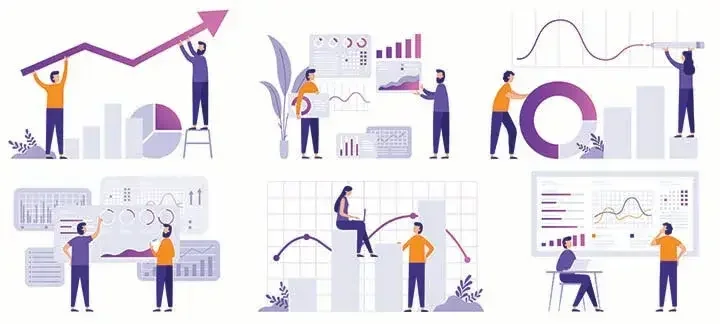Data analytics is booming thanks to ever-evolving technology and tools. With the World Economic Forum reporting that "data analyst" is one of eight jobs that every company will be hiring for in 2020, businesses of all sizes and types are incorporating data analytics into their business planning.

Data analytics is the process of using raw data to answer business questions that often include: What's the market size for this product or service? Who's the target audience for it? What marketing tactics is my audience responding to?
While big business has automated much of this, startups are often very hands-on, using tools most are familiar with already—Google Analytics, Google Search Console, and Excel.
Find out why data analytics is an important part of creating and running a successful startup.
What is data analytics?
Data analytics helps give businesses the facts needed to make decisions. It can spot trends, reveal hidden opportunities, or help explain problems.
"For our company, data analytics is important for two reasons. First, it gives us an edge because a lot of our competitors are not using data to drive their decisions. Second, in a heavy lead-driven business, we need to quickly test and figure out which marketing channels are producing not only the most leads but also the best ones," says Nicholas Bond of home-buying company Renovation 320.
For Jessica Rose of water bottle retailer Copper H2O, it's a no-brainer. "The tools are there, and those that use them can have a stronger and smarter business. So, why not?" she asks.
How startups use data varies
The role data analytics plays varies according to business needs. Some use it to determine concept viability. Property manager comparison site RentRound.com used it to study specific market rental property volume trends and the number of rental property managers. "As a result, we were able to set targets on how much market share we are aiming for and how much profit that would generate," says Raj Dosanjh.
E-commerce operations often use it to study and improve their customers' experiences on the website. FMRU Clothing analyzes data related to how shoppers find and use the site and their demographics. "It's the best way to know exactly what to adjust on your site. Most startups, including ours, function on a continuous building model that's based on customer feedback, and these analytics are a very easy way to get that without actually talking to users," says founder Lucas Koren.
At product development software company Airfocus, developers analyze data coming out of app use to make product development decisions. "For example, we found out that some of the features that we spent weeks to build end up being unused," says co-founder Malte Scholz.
Data analytics tools small businesses use
When it comes to tools, don't overthink it.
"Nothing can beat Excel in terms of simplicity of use for data analytics," says Jeremy Owens of home meat smoker comparison site SeriouslySmoked.com. "Aside from its wide range of functions, it also has a lot of prebuilt features that make data analytics easier," he says.
Many companies, including Node Marketing, rely on Google Analytics to acquire and analyze website traffic patterns and user experience data such as traffic channels, sessions per user, and conversion rates. To understand what its target audience searches for online, Ringagement.com, a content platform for engagement ring shoppers relies on Google Keyword Planner and Ahrefs.
At Renovation360, Bond uses CallRail to assign different telephone numbers to specific marketing tactics, so he knows which approach generates telephone calls. Zapier allows him to automatically transfer information from online customer forms to Excel spreadsheets, while Crazy Egg tracks how visitors use the website.
Marketing firm Green Flag Digital uses data visualization tool Tableau plus site traffic and performance resource Google Search Console, while startup Help A Teen is using Ubersuggest for keyword research.
The tools you'll use depend on what you need to research and assess, so start, but don't stop there. Mike Kawula of Help A Teen stresses the importance of taking action, saying, "What doesn't get measured never grows."

